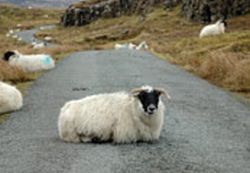
Late last summer, before his new collection STRONG IS YOUR HOLD came off the press, Galway Kinnell gave a reading locally, for the northern Vermonters who claim him as one of their own. (Some of them came from New York City, too...) That is, he tried to read -- and to his consternation, he lost most of his voice, and between that and the heat and the crowd, it was a tough event.
So this evening, he graciously offered a second chance, in the high-ceilinged glory of Athenaeum Hall in St. Johnsbury, where many a poet, novelist, biographer, politican, even the traveling speakers of the 19th century like Russell Conwell ("Acres of Diamonds") have spilled forth rich language. In the audience were other authors, a book designer, a magazine editor, professors, high school teachers, an innkeeper, a contractor, a marketing pro, retirees -- and a handful of high school students. And whether it was the comfort of reading "at home" or the sight of the neighbors or their enthusiastic questions, the grand poet responded amply.
He told a bit about Rilke before reading his popular new poem "Dinner Party," said that Rilke believed the moment of the poem could easily be missed, and hence one shouldn't go out to be with others, but should simply wait at the desk for the muse. "Are you like that?" one listener asked him.
"I don't actually agree with Rilke," Kinnell replied. "Although I've translated a large bulk of his poems -- I don't like him." He continued, "Rilke's work is greatly marred by his inability to love."
"Strong is your hold O mortal flesh / Strong is your hold O love," wrote Whitman in "Last Invocation," from which Kinnell drew the title for the new collection. Much of the work in it recounts incidents that only love brings about: moments with his children, and with his wife, some stunningly intimate.
Another neighbor (and up here, a neighbor is someone who lives within visiting distance) asked Kinnell why he'd written so much about the Vietnam war, but not yet about the current one in Iraq.
"When that war started, I felt like I was the only person in the country that knew what was happening," Kinnell mourned. Invited to a dinner party of doctors in the neighboring town then, he spilled his passion about the war and against it -- and felt the silence of the room and the gradual withdrawal, one by one, of the fellow guests.
He admitted to writing poetry as a teenager, but without seriousness. Then, "I realized that poetry was central to my life. I was writing, but I wasn't writing well." He thought perhaps he'd become editor of POETRY magazine or something like that. Gradually his writing changed, and he now says his habit, good or bad, is to strive for perfection. So when a teen asked him whether that ever pushed him toward maybe revising something that he felt he didn't have quite right, he exclaimed to her with a tender smile, "Oh, my dear!" Then he held out his copy of the "new" book -- already marked in ink with a rewritten final line to the poem "Field Notes."
Although he regularly reads aloud many of the poems from STRONG IS YOUR HOLD at his author events, the central poem,"When the Towers Fell," the one that focuses the book, is one he doesn't often provide to audiences. It's too long, for one thing. Six pages. This evening he took "author's privilege" and condensed it, reading about half the stanzas, and carefully delivering the Middle French and German sections in translation.
Prompted by more questions, he explained that he had started writing the poem because of the classes he taught at New York University at the time. His students were breathing the disaster, walking through it, crying; they came to him and said, "How do we cope? What do we do?" He told them, "Write about it," and set an example by penning three lines -- lines that he now calls "quite bad." He enriched them with observation, sitting for a morning in a food stand erected by McDonald's for the firefighters and rescue crews. The first publication of the poem took place in THE NEW YORKER at the one year anniversary of the attack of September 11, 2001. An audience member asked him whether he'd mixed narrative and lyric in it, and he said yes, calling the work (as it now stands) a series of moments rather than a narrative. "And I think it's better in poetry to get as much narrative as possible out of it. Maybe better for all writing."
Gently, he confirmed that more revisions would take place. He added, "Sometimes one doesn't get everything right the first time, but then when it's published in a book, it has an objective reality that allows you to see what needs to be changed."
And then, steering the conversation back from theory and poetics to love, he read aloud his "Shelley," which turns away from both the early poet's ways and some of his own youth, and wrapped the evening and the audience in the delicious love poem "Field Notes":
.., in the taxi on the way home we kissed
a mint from the maitre d's desk
from my mouth to hers,
like cedar waxwings.
...
I slid around the foot
of the bed and climbed in
and slid toward the side lined
with the warmth and softness
of herself, and we clasped each other
like no birds I know of.
Our cries that night were wild,
unhinged, not from here,
like the common loon's.


